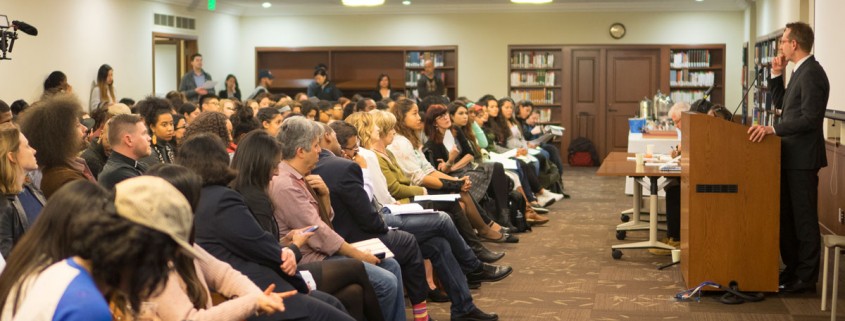USC hosts forum on campus climate
Efforts to reform the campus climate were discussed at the first ever campus climate open forum held in Doheny Memorial library Wednesday night. This forum is the first of five this semester, held to produce a set of benchmarks or desired outcomes to move toward a better climate on campus.
The panel, titled “Where We Have Been, Where We Are Going”, was sponsored by the USC Office of the Provost and the USC Dornsife Office for Diversity and Strategic Initiatives.
The two-hour panel was moderated by Tara McPherson, a professor in the School of Cinematic Arts, and included senior administrators such as Michael Quick, provost and senior vice president for student affairs, and George Sanchez, the vice president of the Dornsife Office for Diversity and Strategic Affairs.
The student panelists included Mykaila Williams, the executive director of the Black Student Assembly and Debbie Rumbo, an alumna who majored in political science and graduated in 2013.
After the impromptu meeting on Nov. 12 with Vice President of Student Affairs Ainsley Carry and Quick, a “Provost Task Force” was launched. The proposed task force consists ten individuals; two undergraduate students, two graduate students, two faculty members, two staff members, Carry and Varun Soni, dean of Religious Life.
The panel began with McPherson bringing up the difficulty about having conversation on diversity on campus, and the need to challenge issues with fervor and transparency.
“When I hear the repeated statement ‘the people aren’t ready,’ it’s like telling a person ‘don’t jump in that water until you learn to swim’,” McPherson said. “You’ll never learn how to swim if you don’t get in the water. So we’re going to jump in.”
Provost Michael Quick echoed these sentiments, as well as thanking the students and faculty involved with the development of the resolution.
“These are difficult issues, these are issues that are hard to really talk about in deep ways,” Quick said. “I appreciate the time that people have spent in having these conversations.”
Quick then spoke on a necessary commitment to the campus issues, and the need for college campuses to live up to their progressive reputations.
“Universities are going to figure out a way forward on issues that we are talking about right now. We are going to be the standard-bearers, not only for other universities but for how this country is going to deal with issues around diversity and access to opportunity,” Quick said.
Quick addressed the positive aspects of implementing diversity initiatives.
“When we talk about campus climate, that’s an important endpoint in and of itself but I think it also is the launching pad for us to accomplish much more,” Quick said. “If we don’t have the appropriate climate so that our students and our faculty feel like they can do the best work they can do, then what are the chances we’ll be able to recruit even more students, even more faculty?”
Williams spoke next on the panel. Williams gave poignant vignettes of marginalized students at USC; including a student being escorted to class by DPS officers out of fears for other students, and transmisogynist graffiti scrawled on dorm-room doors.
“[The student] who had to be escorted to classes by DPS at a certain point in his career was not for his safety but the safety of other students because they were afraid of him” said Williams.
Williams also suggested a zero-tolerance attitude to discrimination on campus, when dealing with racial-, gender- or sexual- based prejudice.
“Just as the death of a student is addressed to the entire USC community, instances of bigotry, racial profiling and sexual assault and instance of discrimination have to handled with that same sense of urgency,” Williams said.
George Sanchez, vice dean of diversity and strategic initiatives, asked audience members to refer to a timeline of the history of USC.
“What happened in 2011 was a step back,” Sanchez said of when Provost Elizabeth Garrett’s administration put in place cuts to diversity programs.
Rumbo provided the perspective of a representative of both a USC graduate and a woman of color. Rumbo spoke of her clean record as a college student and her subsequent arrest on campus.
“I was still a black woman in Los Angeles. I was still a Latina in Los Angeles,” Rumbo said.
Rumbo drew parallels to other elite universities and the action over these issues. Rumbo presented a copy of Yale Alumni Magazine to the audience and spoke of the lack of discussion occurring at other institutions.
“USC is at the forefront of this movement,” Rumbo said.

